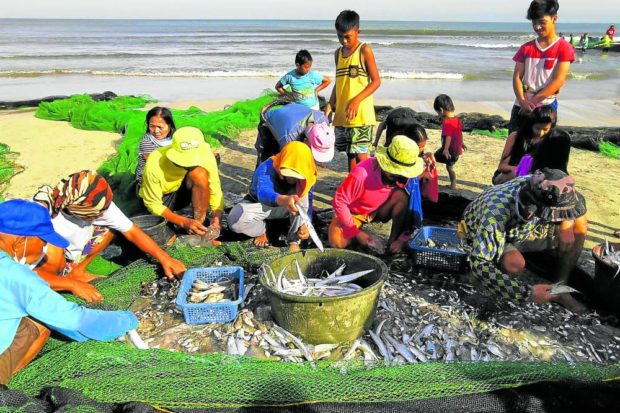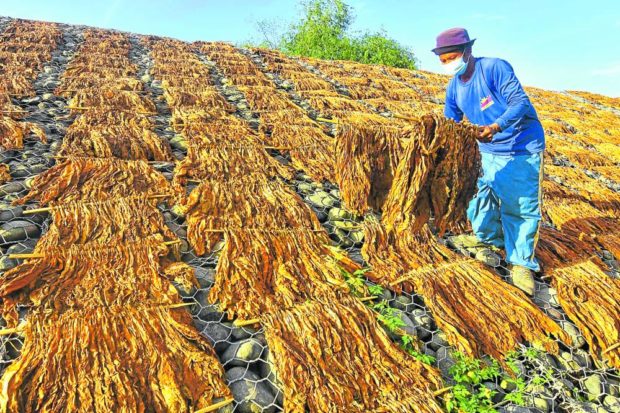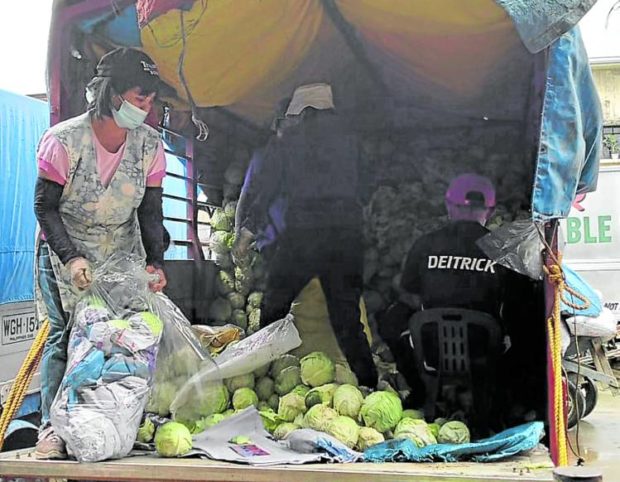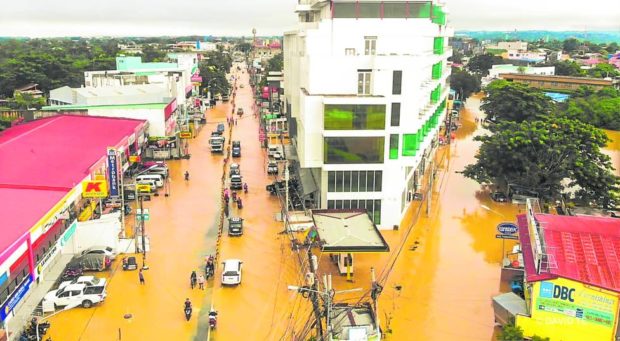Protecting farmers, environment top issues of N. Luzon voters

AT RISK | Fishermen in Binmaley, Pangasinan province, sort out fish caught from Lingayen Gulf in this photo taken on Jan. 30. Villagers fear that a proposed black sand mining in the gulf will affect their livelihood.—WILLIE LOMIBAO
(First of a series)
Northern Luzon, with its 15 provinces spread out in the three regions of Ilocos, Cagayan Valley, and Cordillera, accounts for more than 6.9 million votes in the May elections.
Fertile lands in these provinces supply major markets of vegetables, rice, corn and tobacco, while its rich fishing grounds pump life to coastal communities. Northern Luzon’s forests — from the Cordilleras to the Caraballo Mountains to the Sierra Madre — are among the remaining green patches in Luzon and host the headwaters of the island’s great rivers where clean energy is derived.
Indigenous people communities in the north are the keepers of a unique heritage, making these regions attractive ecotourism and cultural destinations for people wanting to learn more about the country’s history.
Northern Luzon has also endured natural disasters, especially the provinces in Cagayan Valley that are perennially battered by strong typhoons and widespread flooding in recent years.
Article continues after this advertisementGiven this landscape, what are voters expecting from candidates seeking elective posts on May 9?
Article continues after this advertisementIn the Cordillera, a primarily farming region, voters are hoping that candidates can present a viable and long-term solution to the unabated smuggling of agricultural products.
Benguet vegetable traders are seeking the revival of a task force to address vegetable smuggling amid a “lukewarm” response from concerned government agencies.
Agot Balanoy, spokesperson for the League of Associations at the La Trinidad Vegetable Trading Post, said this multisectoral task force was their only “glimmer of hope” to save the ailing industry and the struggling farmers.
In 2016, Republic Act No. 10845 (Anti-Agricultural Smuggling Act) was signed into law to promote Filipino farmers’ productivity and protect them against smugglers and importers.

CASH CROP | A farmer dries tobacco leaves on the slope of a dike road at Barangay Gualsic in Alcala, Pangasinan, in this photo taken in March. Tobacco farming is one of the major cash crops in the Ilocos region. —WILLIE LOMIBAO
But six years after it was enacted, Balanoy said smuggling of vegetables had worsened. Smuggled vegetables, she said, used to be clandestinely sold at night, “but today it happens in broad daylight.”
“Smuggling remains an important election issue and the next elected leaders must have political will to stop smuggling and alleviate the plight of the local farmers,” Balanoy said in a text message on April 7.
Overdevelopment
In Baguio City, issues about overdevelopment, aggravated by breaches in the carrying capacity of resources like water and waste management, are among the campaign platforms of city candidates.
But a COVID-19 survivor, who is also a Baguio doctor, is asking them to focus on environmental measures that would reduce or eliminate future diseases brought about by human intrusion into plant and wildlife habitats, particularly in Baguio, Benguet and Cordillera forests.
Dr. Elizabeth Macliing Solang, one of the first health-care workers to be stricken with COVID-19 in the city, cited scientific research that ties recent pandemics to “urbanization, economic development and a societal shift toward environmental apathy.”
“Habitat destruction not only increases our contact with wildlife but disrupts the natural balance in ways that can fuel pandemics,” she said, quoting from a speech she delivered during the International Women’s Month in March.
Baguio had also been declared a safe haven for activism, which a religious leader said should be an election issue.

TRADERS’ HUB | Workers at the vegetable trading post in La Trinidad, Benguet, unload vegetables coming from other areas in the Cordillera in this April 3 photo. Local farmers continue to fight the unabated vegetable smuggling in the country. —ALLAN MACATUNO
Bishop Reuel Norman Marigza of the United Church of Christ in the Philippines said: “In a democracy, the interplay of those who govern and those who oppose and dissent are necessary ingredients, We should choose candidates who respect dissent and freedom of expression and who are not threatened by activism.”
Agri, black sand mining
In Pangasinan, Samahang Industriya ng Agrikultura (Sinag) said candidates must focus on agriculture, which is also the major industry of the province.
Rosendo So, Sinag president, said the skyrocketing prices of fertilizer and fuel are forcing farmers to spend P74,000 on planting and harvesting a 1-hectare plantation of rice or corn. Farmers use diesel for water pumps and other farm equipment.
“We have been asking the government to suspend the 12-percent VAT (value-added tax) and excise on fuel for at least three months,” So said.
Apart from agriculture, another major issue that faces residents of Pangasinan is black sand mining in Lingayen Gulf, an already environmentally critical body of water.
The project will extract 25 million metric tons of black sand from the gulf and displace close to 50,000 people who are dependent on the gulf for their livelihood, according to the University of the Philippines Marine Science Institute (UP MSI).
Since November last year, the UP MSI has been opposing the project, saying Pangasinan is at risk of suffering “irreversible” damage if the seabed is disturbed. UP MSI maintains a marine science laboratory in Bolinao town in Pangasinan.
According to the UP MSI, the project would only serve the “short-term interests of those who will profit from a misguided development that threatens the lifeblood of Pangasinan and La Union.”
“What office and who among the candidates are against [black sand] mining and what are their plans of action to save Lingayen Gulf?” asked Irene de Vera, a professor at the Pangasinan State University Binmaley campus.
Tobacco industry
In the Ilocos provinces, tobacco farmers want candidates to improve the quality of their lives.
According to Bernard Vicente, chair of the National Federation of Tobacco Farmers Association and Cooperatives, farmers in Ilocos Sur have been planting tobacco only to make ends meet.
“I think it is time that they finally heed our call to help us improve our lives as until now, we do not feel that there is development for our sector,” said Vicente in Ilocano.
The government earns about P1.25 million tax from a hectare of land planted with Virginia tobacco, said Vicente.
Despite this, he lamented how the plight of tobacco farmers is continuously neglected even though they contribute to the region’s economy.
Vicente’s group is asking local officials for alternative sources of income which would allow them to earn, instead of being idled, when they wait for their tobacco yield which usually covers a six-month period.

PERENNIAL WOE | Roads, streets and homes in Tuguegarao City are submerged at the height of the severe flooding that hit Cagayan province on Nov. 14, 2020. —DAVID TE/Contributor
These alternative sources would also allow tobacco farmers in the province to stand on their own feet when the World Health Organization’s Framework Convention on Tobacco Control, to which the Philippines is a signatory, would be fully realized, said Vicente.
The framework aims to reduce harmful tobacco consumption in signatory countries which could affect their demand and production of tobacco, he added.
For Alyansa ti Mannalon ti Ilocos Norte leader Genaro de la Cruz, local government programs on alternative sources of income should empower farmers. “We have to organize, educate and introduce to them other viable economic activities aside from what they have been depending on,” he said.
Disaster response
In Cagayan Valley region, torrential rains and typhoons during the rainy season have triggered severe flooding, especially in the provinces of Cagayan and Isabela, in recent years, like the one that occurred in November 2020 at the height of Typhoon “Ulysses” (international name: Vamco).
The massive flooding was described by local government officials as the worst they had experienced in 40 years. It affected at least 151,600 families in Cagayan and Isabela and killed 24 people.
Residents in these areas were hoping that candidates could provide solutions to the perennial disaster as local officials admitted that environmental destruction had aggravated the situation.
In the northernmost province of Batanes, which regularly experiences damaging typhoons, residents said they were hoping that aspiring local and national officials would prioritize their community over their personal interests.
“Our island’s geographic location situates us in a spot where our exposure to natural disasters is so high [that] we cannot do anything about that,” said Chairmaine Gato, a government employee in Itbayat town.
But it is during disasters, she said, that they get the chance to see the quality of leaders they elect.
—REPORTS FROM KIMBERLIE QUITASOL, VINCENT CABREZA, YOLANDA SOTELO, JOHN MICHAEL MUGAS, VILLAMOR VISAYA JR. AND NATHAN ALCANTARA
RELATED STORIES
Benguet farmers hold caravan to protest vegetable smuggling
Agriculture smuggling: An unending torture for PH farmers